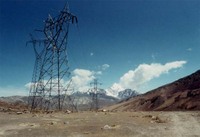Sixth Anniversary of the Disappearance of Bolivia PCV Walter Poirier
March 9, 2007 - assembled by PCOnline
 Family says it has been a constant battle to insure that Missing PCV Walter Poirier III is not forgotten by the Peace Corps
Family says it has been a constant battle to insure that Missing PCV Walter Poirier III is not forgotten by the Peace Corps
It has been exactly 6 years today since my son was declared "officially" missing by Peace Corps. Since then it has been a constant battle to insure that he is not forgotten by Peace Corps. Very little communication has been coming out of Peace Corps since the House hearing on Volunteer safety in 2004. It took some arm twisting by the Massachusetts senate delegation and our 5th District congressman to even get Peace Corps to keep Walter on the active list. As of this year, there has been no communication from the new Director regarding our son's status. Come to think of it, there has been no communication from him at all. The Poirier family is still hoping against hope that Walter will be found, but there is little if anything being done by Peace Corps it seems at this time. Signed Walter Poirier
Statement of the Peace Corps on the Current Status of the Investigation
The Peace Corps Office of Inspector General (OIG) is currently analyzing past investigative/search activities to determine what, if any, further efforts can be undertaken with respect to Walter’s Poirier’s disappearance. We will advise the Poirier family of any new activities shortly. The OIG considers this matter to be an open and active case and we continue to coordinate with our Bolivian counter-parts and pertinent factions of the U.S. law enforcement community to follow-up on all actionable information.
From 2005: Probe botched, say family of Peace Corps Volunteer Walter Poirier lost in Bolivia
Mr. Poirier joined the Peace Corps shortly after graduating from Notre Dame University in 2000 and had been in Bolivia for about six months when he was declared missing. An extensive search was carried out soon by U.S. and Bolivian authorities in the Zongo Valley, near the room where he stayed and at places he frequented. In addition, a publicity campaign was conducted on Bolivian radio and television, and in newspapers. At the insistence of the Poiriers, the Peace Corps recently boosted to $50,000 the reward for information leading to the recovery of their son's body. The family is contributing half the amount.
But U.S. authorities said they have gotten nowhere. "The effort to obtain additional information on the disappearance of Walter Poirier has been extremely frustrating," the U.S. Embassy said. "Despite a number of apparently promising leads, every trail thus far has been unproductive." In June, under pressure from Mr. Meehan and Sens. Edward M. Kennedy and John Kerry, the Peace Corps agreed to hire a full-time investigator. The unidentified investigator began work in September and was given six weeks to do an in-country assessment, said a Bolivian private investigator hired to assist him. The Bolivian investigator said they had not identified any solid leads, nor finished reading the mounds of paperwork given to them to review when the Peace Corps investigator left Bolivia in mid-November.
 (left) The Mountains near Zongo Pass in Bolivia where Ramiro Machaca alleges the body of Walter Poirier may be buried.
(left) The Mountains near Zongo Pass in Bolivia where Ramiro Machaca alleges the body of Walter Poirier may be buried.
Raising hope for a break in the case, a formal criminal complaint was filed with La Paz police in August against two persons in connection with the volunteer's disappearance. In the complaint, which obliges La Paz police to investigate, Ramiro Machaca, 22, an Aymara Indian, said he was kidnapped May 23 and held for six days in a Zongo Valley river tunnel near the Wahi electric plant. Mr. Machaca, who worked at the plant, said he was kidnapped because in February, while cleaning the machines at the plant one evening, he had overheard two other employees discussing Mr. Poirier. Mr. Machaca said they were celebrating and drinking alcohol. "One of them made a toast to 'el chango' Walter Poirier," Mr. Machaca said, using slang for "the kid." "Then, they began talking about what they did with his body," he said, adding that the two mentioned it was buried in the mountains below Zongo Pass.
Several witnesses have corroborated to La Paz police the kidnapping of Mr. Machaca. A medical report from Agramont Hospital in El Alto, near La Paz, said he was brought there May 30 in a "metabolic coma." A doctor wrote that Mr. Machaca also bore head injuries, with signs of strangulation and lack of oxygen to the brain. But formal criminal charges have not been filed. La Paz District Attorney Audalia Zurita said the authorities need more evidence. She said last month that she last communicated with the U.S. Embassy about the Poirier case in late September. She said her office wants to conduct a monthlong search for Mr. Poirier's body in the areas of Zongo identified by witnesses who have come forward in connection with the Machaca case, but the U.S. Embassy wants a more precise location before it hires specialists and equipment.
"I still believe the information we have on the possible whereabouts of Poirier is credible, but I need help convincing the U.S. Embassy," Mrs. Zurita said. But others say Bolivian authorities share much of the blame for the failed investigation into Mr. Poirier's disappearance. His parents also think more can be done. "We are perplexed as to why the embassy and Peace Corps have not embraced this lead," they said. "The Poirier family feels that, from the beginning, the Peace Corps was inept and unprepared to handle our son's disappearance - they simply did not know what to do."